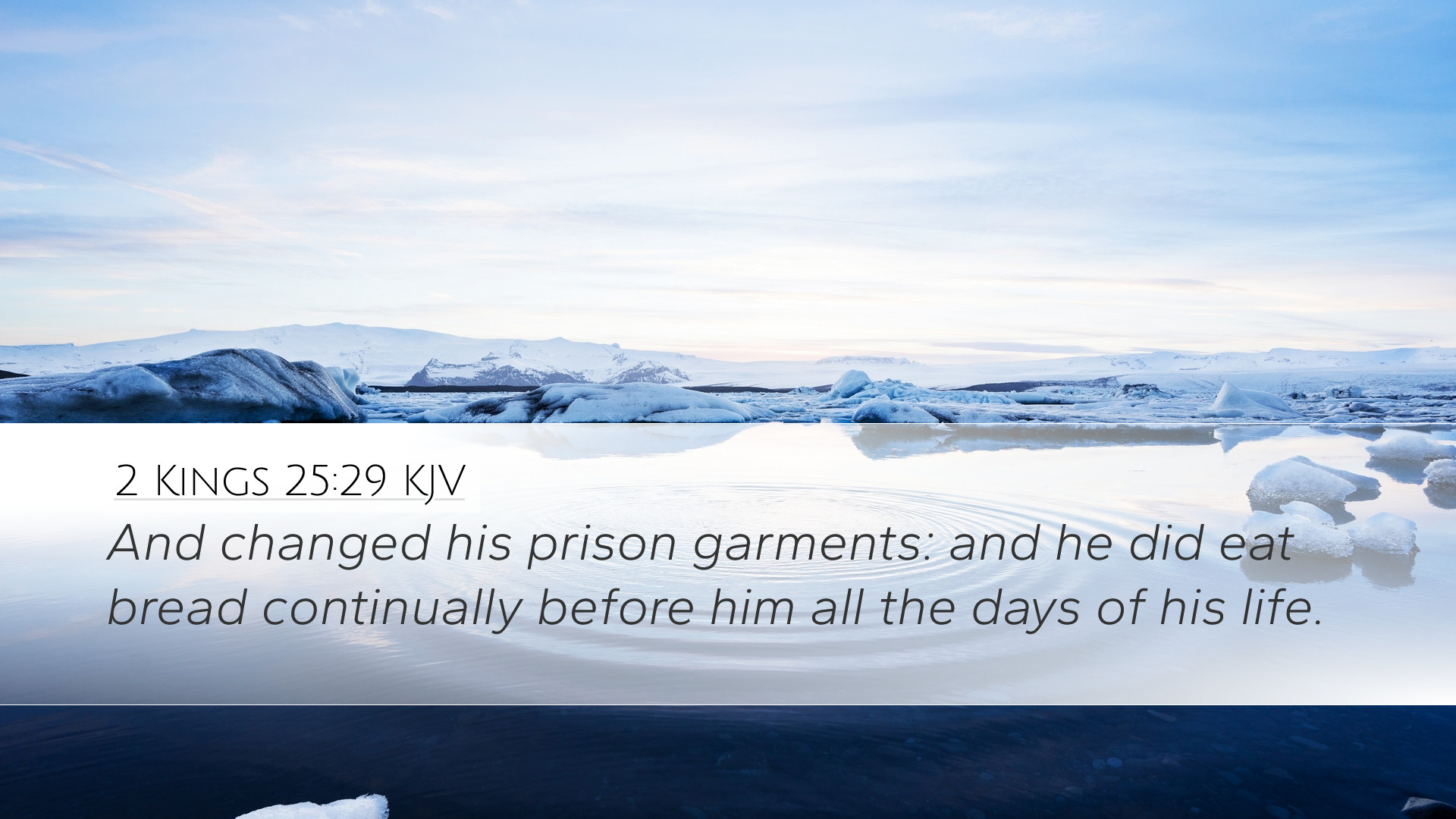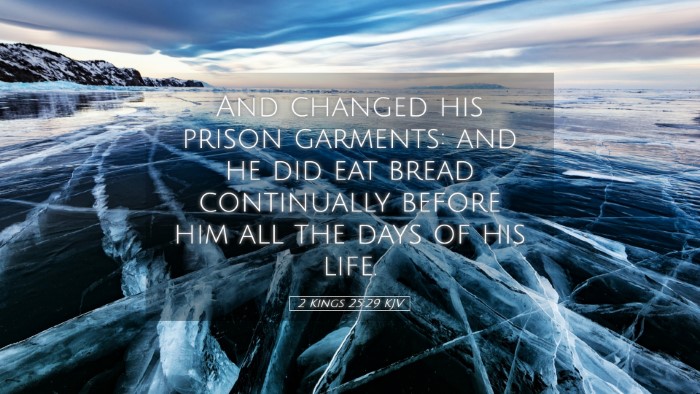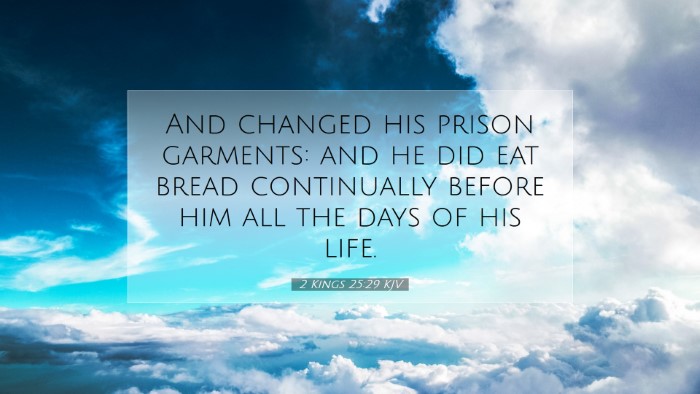Commentary on 2 Kings 25:29
Bible Verse: "And changed his prison garments: and he did eat bread continually before him all the days of his life."
Introduction
This verse concludes the narrative concerning Jehoiachin, the king of Judah, who was taken captive by the Babylonians. It marks a significant turning point in his life, illustrating themes of restoration, mercy, and divine providence. Various commentators provide insights into the implications of Jehoiachin’s change of fortune and the significance of his circumstances.
The Context of 2 Kings 25
The chapter as a whole narrates the fall of Jerusalem and the Babylonian exile, culminating in the fate of its king, Jehoiachin. His story offers a poignant picture of the consequences of disobedience yet also reflects the hope of redemption through God's grace.
-
Historical Significance:
Jehoiachin's capture and subsequent treatment by the Babylonian king Nebuchadnezzar illustrate the political ruin of Judah and the prophetic fulfillment of judgment. His conduct while in captivity reflects both the tragedy of his kingship and the tender mercies of God.
-
The Role of Providence:
Despite his imprisonment, Jehoiachin's life was preserved, underscoring God’s sovereignty even in dire circumstances. This acts as a reminder of God's continual purpose amidst human failure.
Insights from Commentators
Commentators such as Matthew Henry, Albert Barnes, and Adam Clarke provide diverse viewpoints on this particular verse, each highlighting vital theological themes.
Matthew Henry's Perspective
Henry posits that Jehoiachin's release signifies a notable shift from misery to ease, marking a time of divine favor. He emphasizes that Jehoiachin's new garments symbolize a change in status and a restoration of dignity after the humiliation of captivity.
-
Change of Garments:
Henry notes the importance of clothing in the biblical narrative, suggesting that new garments represent a fresh start, indicative of God's mercy.
-
Continual Provision:
The provision of daily bread signifies God’s ongoing sustenance for His people, showing that even in captivity, God provides for those He loves.
Albert Barnes' Insights
Barnes focuses on the implications of Jehoiachin’s life post-captivity. He argues that the king's experience reflects the overarching narrative of Israel's struggle and restoration.
-
Restoration of the King:
Barnes emphasizes the mercy shown to Jehoiachin by Nebuchadnezzar, suggesting it mirrors God’s grace, allowing hope for future restoration of Israel.
-
Theological Implications:
This verse serves as a commentary on the nature of God—merciful, yet just. Jehoiachin’s release, though delayed, illustrates God's faithfulness to His promises.
Adam Clarke’s Analysis
Clarke offers a deeply theological insight, connecting Jehoiachin's experience to broader themes of redemption and the kingdom of God. He reflects on the transformation through suffering and grace.
-
Transformation Through Suffering:
Clarke contextualizes Jehoiachin’s suffering as not pointless but part of a divine plan that leads to a greater restoration, akin to how believers are often refined through trials.
-
Symbol of Hope:
He argues that Jehoiachin serves as a figure of hope for Israel's future. His freedom foreshadows the coming of the Messiah, who brings eternal liberation.
Theological Themes
As we examine 2 Kings 25:29, several theological themes emerge that merit further reflection:
-
Divine Mercy:
The moment of Jehoiachin’s release and revitalization serves as a testament to God's unwavering mercy, reinforcing the idea that divine grace often comes after periods of punishment.
-
Human Response to Grace:
The transformation of Jehoiachin calls for a response of gratitude and humility. It exemplifies how mercy should inspire a changed life and actions.
-
The Necessity of Repentance:
While Jehoiachin experiences forgiveness, the context of his previous sins serves as a reminder of the importance of repentance before restoration can fully occur.
-
Opportunity for Leadership:**
Even in captivity, Jehoiachin is presented with a leadership role to some extent, suggesting that one can still rise to dignity and purpose even in challenging circumstances.
Application for Pastors and Leaders
The lessons derived from this passage resonate deeply with pastors and church leaders today:
-
Hope in Despair:
Communicating the theme of hope amidst despair is essential. Jehoiachin’s narrative aids in illustrating to congregations that God’s mercy prevails even in our lowest moments.
-
Restoration Opportunities:
Pastors are encouraged to create environments where individuals feel the weight of restoration, helping church members understand that their past does not dictate their future in Christ.
-
Teaching on Grace:
This passage provides an opportunity to teach about God’s grace and the importance of personal spiritual growth stemming from divine encounters.
Conclusion
2 Kings 25:29 encapsulates crucial themes of grace, restoration, and divine providence. The reflections of esteemed commentators highlight significant spiritual truths that provide a wellspring of insight for theologians, pastors, and students alike. As we meditate on this verse, we are reminded of God's faithfulness through all trials and the transformative power that His mercy can instill in our lives.


